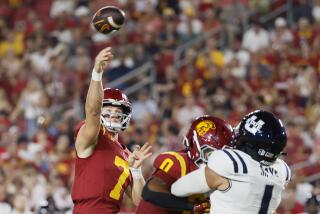The Utes Have No Need to Feel Defensive : Freedom Bowl: They won five of their last six games with an offense that averages nearly 500 yards.
- Share via
Here’s all you need to know about the University of Utah team that faces USC in the Freedom Bowl Thursday night at Anaheim Stadium:
The Utes play in the wild Western Athletic Conference, and you ought to know what that means by now.
If not, listen to Utah Coach Ron McBride, who will talk for hours about his team’s offensive firepower, quarterback Mike McCoy’s progress, his gifted wide receivers and the running of fullback Jamal Anderson.
But coach, what about your defense?
McBride kicked at the grass after a recent Utah practice and acknowledged that the WAC’s reputation as a defenseless conference is well-earned.
“I do think our defenses leave a little to be desired,” McBride said.
Why?
“It’s tough getting the players to play the defense you need to play,” he said.
Some of that has to do with WAC teams’ commitment to the pass. Opponents know what’s coming, but stopping the onslaught often proves impossible, hence scores such as Utah’s season-ending victories over Air Force (41-24) and Brigham Young (34-31).
The Utes (7-5) are fifth nationally in total offense, seventh in passing and 54th in rushing. They average 30.8 points and 484.6 yards.
But they are 95th defensively--85th against the pass, 55th against the rush--and gave up 30.7 points and 430 yards per game.
If those numbers sound vaguely familiar, it’s probably because Fresno State had a similar profile when it faced USC in last year’s Freedom Bowl. And the Trojans won’t soon forget the 24-7 loss to the Bulldogs.
Of course, USC will be facing a beat-up secondary Thursday night. Six Utah defensive backs, including starters Jeff Kirkman, Kareem Leary, Ed Miller and Sharrieff Shah, are not expected to play.
McBride isn’t worried.
“This is as good a group as has ever played at Utah,” McBride said. “We have a lot of guys who can make big plays.”
For instance:
--McCoy, a junior who passed for 3,860 yards and 21 touchdowns, averaged 407 yards in Utah’s last six games.
--Four Utes caught 40 or more passes this season, led by wide receiver Bryan Rowley with 55 receptions for 838 yards. Two others caught 20 or more passes.
--Anderson, a senior from Woodland Hills, rushed for 972 yards in 168 carries, a 5.7-yard average, and scored 11 touchdowns.
“It’s not all on my shoulders at all,” said McCoy, who transferred to Utah in 1992 after Long Beach State dropped its program.
“I’m surrounded by, I feel, the greatest set of receivers in the country. Jamal has played excellent. I look at my success as coming from the entire offense. It couldn’t have happened if not for the 10 other guys on the field.”
He has a point, but Utah became a contender for a bowl berth only when McCoy got hot midway through the season, sparking five victories in the final six games.
Early on, Utah seemed doomed to fail. The Utes lost to Arizona State, 38-0, in their opener, then lost to Division I-AA Idaho, 28-17, and New Mexico, 42-35.
But in true WAC style, the Utes won with their offense, outscoring opponents by an average of 38.8 to 31.2 in the final six games. Utah turned a 17-14 halftime deficit into a rout of Air Force, and had a 17-point fourth quarter to defeat BYU.
Chris Yergensen’s 55-yard field goal with 25 seconds left gave the Utes’ their first victory over the Cougars at Provo in 22 years.
“It was huge,” McBride said.
McCoy completed 29 of 48 passes for 434 yards and three touchdowns. Greg Hooks caught seven passes for 134 yards; Rowley had seven receptions for 75 yards and one touchdown, and Anderson rushed for a season-high 146 yards.
Utah had a season-high 629 yards of offense, which was a good thing, because the Utes gave up 501.
More to Read
Go beyond the scoreboard
Get the latest on L.A.'s teams in the daily Sports Report newsletter.
You may occasionally receive promotional content from the Los Angeles Times.










